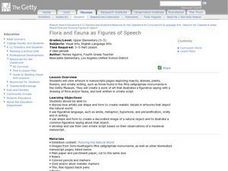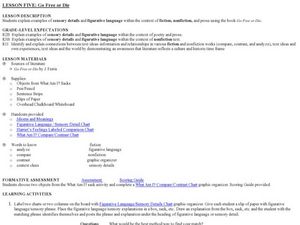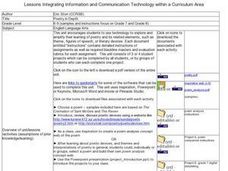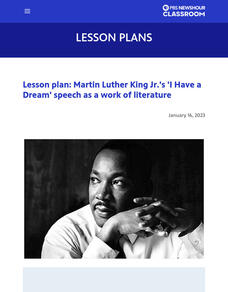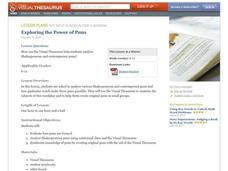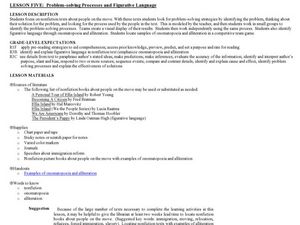Curated OER
Flora and Fauna as Figures of Speech
What a lovely way to incorporate artwork into your language arts activity. View artwork in illustrated manuscript pages, depicting insects, animals, plants, flowers, and ornate writing in the Getty Museum. Practice using figurative...
Curated OER
Go Free or Die: Figurative Language
Figures of speech, sensory details, and academic language are all targeted while reading Chapter Two of J. Ferris’ Go Free or Die. First, learners engage in an exercise to practice describing with detail. Then, partners use a...
Curated OER
Edward Lear, Limericks, and Nonsense
Introduce your class to the delights of nonsense poetry and explore literary devices with the writing of Edward Lear. Learners identify rhyme and meter as well as figures of speech, alliteration, and onomatopoeia in "The Owl and the...
Curated OER
Reading the Play
Do figures of speech enhance a play or story? In small groups, learners locate and describe figures of speech they find while reading a reader's theater play. After making predictions, they describe how the figures of speech make the...
Curated OER
Poetry in Depth
Scholars use technology to explore poetry and its related elements, such as theme, figures of speech, and other literary devices. They complete four poetry projects including a poem analysis with a concept web, an interactive poem...
Curated OER
Let's Focus on Idioms
Get online and explore idioms. Your class will use the Internet to locate, choose, and illustrate their favorite idioms. They make a class PowerPoint with illustrations for their idioms and explain the meaning of each. A great way to...
EngageNY
Grade 11 ELA Module 2: Unit 2, Lesson 10
Audre Lorde's poem "From the House of Yemanjá" describes the speaker carrying two women on her back—she must be strong! Pupils read the second stanza using instructional activity 10 of 14 from the Grade 11 ELA Module 2: Unit 2 series....
Curated OER
Lesson 3: Idioms
You're as cute as a bug. But are you really as cute as a bug? Bugs aren't cute! Idioms are fun nonliteral phrases that mean something different than the words they contain. Second graders learn about idioms as they read the book, More...
EngageNY
End of Unit 1 Assessment: Analyzing an Excerpt from Barack Obama’s Back-to-School Speech
In order to assess their mastery of the concepts taught in a 12-lesson plan unit study of Christopher Paul Curtis' Bud, Not Buddy, individuals read excerpts from President Barack Obama's 2009 Back-to-School Speech and use the strategies...
Curated OER
The Bernstein Bear's Trouble with Money: Financial and Academic Literacy
What do figures of speech have to do with financial literacy? Take an interdisciplinary look at The Berenstain Bears' Trouble with Money to find out. Young analysts read about the cubs' spendthrift ways and how Mama and Papa Bear...
Curated OER
Idioms: Get the Ball Rolling
Based on books written by Fred Gwynne, particularly A Little Pigeon Toad, this resource connects the language of idioms and figures of speech with visuals that make explicit the often humorous connections between the literal and...
Curated OER
Setting the Tone with Figurative Language
Explore figurative language with your secondary class. Extending a language arts unit, the activity prompts middle schoolers to examine how an author's word choice establishes a story's tone, possibly using metaphors, similes,...
EngageNY
Grade 11 ELA Module 2: Unit 1, Lesson 22
Say precisely what you mean. Scholars analyze the importance of Washington's precise language in paragraphs eight and nine of the "Atlanta Compromise" speech. They interpret his figurative language and add it to their Idea Tracking...
EngageNY
Grade 10 ELA Module 1: Unit 1, Lesson 5
If you've ever wished you could respond to an author's message, an instructional activity that connects three poems with the same concept will appeal to you. Based on the first few lessons' focus on Christopher Marlowe's "The Passionate...
Prestwick House
Rhetorical Devices in Political Speeches
Have you ever watched a political speech and felt your heart beat a little faster, and your opinion either solidify or begin to slightly change? Rhetorical devices can be a strong tool in an effective and powerful speech. A short...
Poetry4kids
Simile and Metaphor Lesson Plan
Similes and metaphors are the focus of a poetry lesson complete with two exercises. Scholars read poetry excerpts, underline comparative phrases, then identify whether it contains a simile or metaphor. They then write five...
PBS
Dr. Martin Luther King Jr.’s ‘I Have a Dream’ Speech as a Work of Literature
To appreciate the oratory of Dr. Martin Luther King Jr.'s "I Have a Dream" speech, scholars examine the rhetorical devices and influences that make the speech so famous. They examine background information, conduct a close reading of the...
Curated OER
Figure of Speech
Examine the changing nature of language in the U.S. View and discuss excerpts from a PBS documentary with your class and then conduct Internet research, and complete a team project on the evolution of teen expressions.
Curated OER
Theater: Create a Script
Figurative language is the focus in the book Teach Us, Amelia Bedelia. After reading Peggy Parish's book, class members dramatize idioms from the text, using dramatic strategies such as characterization, exaggeration, and...
Curated OER
Exploring the Power of Puns
Read and analyze a variety of Shakespearean and contemporary puns using Visual Thesaurus computer software. Middle and high schoolers analyze a pun as a class; in small groups they analyze a Shakespearean pun using contextual clues and...
EngageNY
Analyzing Word Choice: Atticus’s Closing Speech (Chapters 20-21)
Choose your words carefully. Scholars begin by reading a line of Atticus's closing speech in To Kill A Mockingbird. Readers work independently on their note catchers, then complete a Think-Pair-Share activity with partners. They finish...
Curated OER
Problem-Solving Processes and Figurative Language
Nonfiction texts about people on the move provide young readers with an opportunity to examine not only the problem-solving strategies employed by immigrants, but to also find examples of figurative language these writers use to tell...
Curated OER
Ethos, Logos, and Pathos in Civil Rights Movement Speeches
Examine three speeches while teaching Aristotle's appeals. Over the course of three days, class members fill out a graphic organizer about ethos, pathos, and logos, complete an anticipatory guide, read speeches by Martin Luther King Jr.,...
Curated OER
Simile and Metaphor
Middle schoolers use context clues to find the figurative meaning of similes and metaphors in writing. They practice using figurative language to help their writing come alive. Use this activity in a lesson about poetry, figurative...
